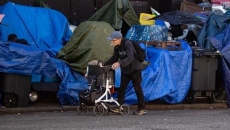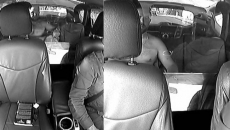A Vancouver family known for its philanthropy is making a $20 million donation to a British Columbia substance use treatment centre in memory of their adult son and brother who died of an opioid overdose.
Jill Diamond, executive director of Vancouver's Diamond Foundation and sister to Steven Diamond, said in a statement that her brother might still be alive today if he had received the care being offered at Vancouver's St. Paul's Hospital.
“No matter where we turned, we never found the help that Steven needed," Diamond said in a news release.
“We’re speaking out today for the first time because we want to save lives."
The donation to the St. Paul's Foundation will help fund the hospital's Road to Recovery program that aims to fill treatment gaps by cutting weeks off waiting lists and providing supports to patients through a full spectrum of treatment services in one location, the statement said.
The Diamond family was expected to attend a news conference in Vancouver outlining the donation.
Steven Diamond was known as a giving addictions counsellor and massage therapist who, despite long periods of sobriety, faced a prolonged struggle with substance use disorder that saw him in and out of treatment, his sister said.
She said her 53-year-old brother was on a list to see an addiction psychiatrist in 2016 when he died of a fentanyl overdose one week before his appointment.
He suffered a "messy system of delays and disappointments," the statement said, in describing Diamond's last days.
The donation supports the Road to Recovery program announced by Premier David Eby in March.
It is funded by the $586 million investment in treatment and recovery services included in the 2023 budget.
The province has committed $60.9 million toward the program's operating costs, said the statement issued by the St. Paul's Foundation.
The 95-bed Road to Recovery program, which will include 45 beds at St. Paul's Hospital, is aimed at creating a seamless recovery journey, beginning with entry through the Rapid Access Addiction Clinic.
Other steps will provide withdrawal management, in-patient recovery-focused beds, transitional housing and outpatient treatment.
The first beds, focused on stabilization, are expected to open in fall of 2023, said the foundation.
Jill Diamond said her brother had professional and personal knowledge of the addictions landscape, as well as "family means" to pay for recovery.
"The fact that even he couldn’t get well, despite giving his entire life’s effort, shows addiction is a disease that must be looked at medically with new models of care," she said. "That’s what today is about.”






